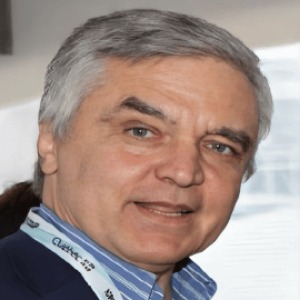Title : Personalized and precision Medicine (PPM) as a unique healthcare model through biodesign driven and inspired biotech, translational applications and pulmonology related marketing to secure the human healthcare, wellness and biosafety
Abstract:
A new systems approach to diseased states and wellness result in a new branch in the healthcare services, namely, Personalized and Precision Medicine (PPM). To achieve the im-plementation of PPM concept, it is necessary to create a fundamentally new strategy based upon the recognition of biomarkers and thus biomarker-driven targeting to secure the grand future of drug discovery to monitor and to control pulmonary disorders. Recent advancements in understanding respiratory diseases have paved the way for PPM-guided clinical practice and treatments, considering individual genetic, molecular and envi-ronmental factors. Innovative technologies, including NGS sequencing and biomarker identi-fication and screening contribute to this approach, allowing for customized treatments and the identification of effective personalized therapies. Additionally, the application of PPM-driven approaches in lung cancer treatment exemplifies the forefront of individualized care within respiratory medicine. In this context, the need for innovative lung disease treatments has become critical since the diseases remain the world’s biggest killer. The pace of innova-tion in Personalized & Precision Pulmonology (PPP) is becoming fast. This approach in which each patient or pre-illness person-at-risk receive the most appropriate treatment according to their characteristics (biological, genetic, environmental) optimizing the benefit and min-imizing side effects has been confirmed as a key strategy that will undoubtedly shift our dai-ly care pathways towards PPM. For instance, chronic obstructive pulmonary disease (COPD) heterogeneity has hampered progress in developing pharmacotherapies that affect disease progression and should be deeply studies for understanding an individual's disease risk and tailoring management based on pathobiology, environmental exposures and psychosocial issues. OMICS technolo-gies and network analytic techniques have started to dissect COPD heterogeneity and identi-fy patients with specific pathobiology and pre-illness persons-at-risk. These approaches show great promise for risk stratification, pre-early (subclinical) intervention, drug repurposing and developing novel therapeutic approaches for COPD. COPD complexity necessitates PPM-driven approaches for precise diagnosis, prognosis and treatment to facilitate pre-early identification of those who will develop severe disease and experience loss of lung function, exacerbations, emphysema progression and significant morbidity and mortality. The role of PPM and PPP in asthma is to determine endophenotypes through specific bi-omarkers and to provide specific targeted therapy for achieving personalized treatment in each patient and prevention in pre-illness persons-at-risk. The application of PPM and PPP not only provides precise diagnosis and treatment but also enables pre-early (subclinical) detection in individuals at risk and prevention of progression and exacerbation in asthma. By leveraging cutting-edge technologies and embracing a multidisciplinary approach, clinicians and researchers are poised to make significant strides in improving respiratory health out-comes. Additionally, compared with the gut microbiome, however the density and diversity of the lung microbiome are limited. The formation and diversity of the pulmonary microbiome (PM) start with the exposure of newborn oral mucosa to maternal vaginal flora with subse-quent microaspiration of the newly formed oral flora into the airways and alveolar epithelial cells. The latter means that advancements in non-culture-based microorganisms detecting methods would have to show that the lung has its dynamic microbiome that interacts with the host through symbiosis and causes pneumonia through dysbiosis. This concept will open the door for PPM-guided approaches in the diagnosis and treatment of pneumonia and in-terstitial lung diseases. Moreover the latest innovations including confocal laser endomicroscopy and molecular imaging deliver visibility into cellular activity that enables physicians to assess areas of con-cern in cases where conventional pulmonary diseases (including lung cancers) screening re-turns ambiguous results. The unique ability to see cells in real time allows physicians to clas-sify areas of interest or concern with confidence. PPM will need to demonstrate that phenotype-based person-specific interventions are supe-rior to the current standard of care and, ultimately have a population effect by moving the mean on the disease spectrum towards Health. Education, Affordability and Public Ac-ceptance of the strategy all play key roles in its ultimate implementation. This is the reason for developing global scientific, clinical, social and educational projects in the area of PPM-based and PPP-guided clinical practice to elicit the con-tent of the new branch. The era of PPM and PPP has brought forth a transformative approach to healthcare including the field of respiratory medicine. By tailoring treatment strategies to individual patients based on their unique characteristics, precision medicine offers the potential to revolutionize the diagnosis, management and prevention of respiratory diseases. Meanwhile infrastruc-ture, financial, regulatory and ethical challenges remain to be overcome for the implementation of PPM in clinical pulmonary practice. Overcoming such barriers and moving from a one-size fits all approach to patient-centered care could improve patient quality of life and survival substantially. We do hope that the PPM-guided proposals would ideally be suited for practitioners who already incorporate integrative approaches in their practice as well as more traditional clinicians who want to learn more about PPP as a growing area.



